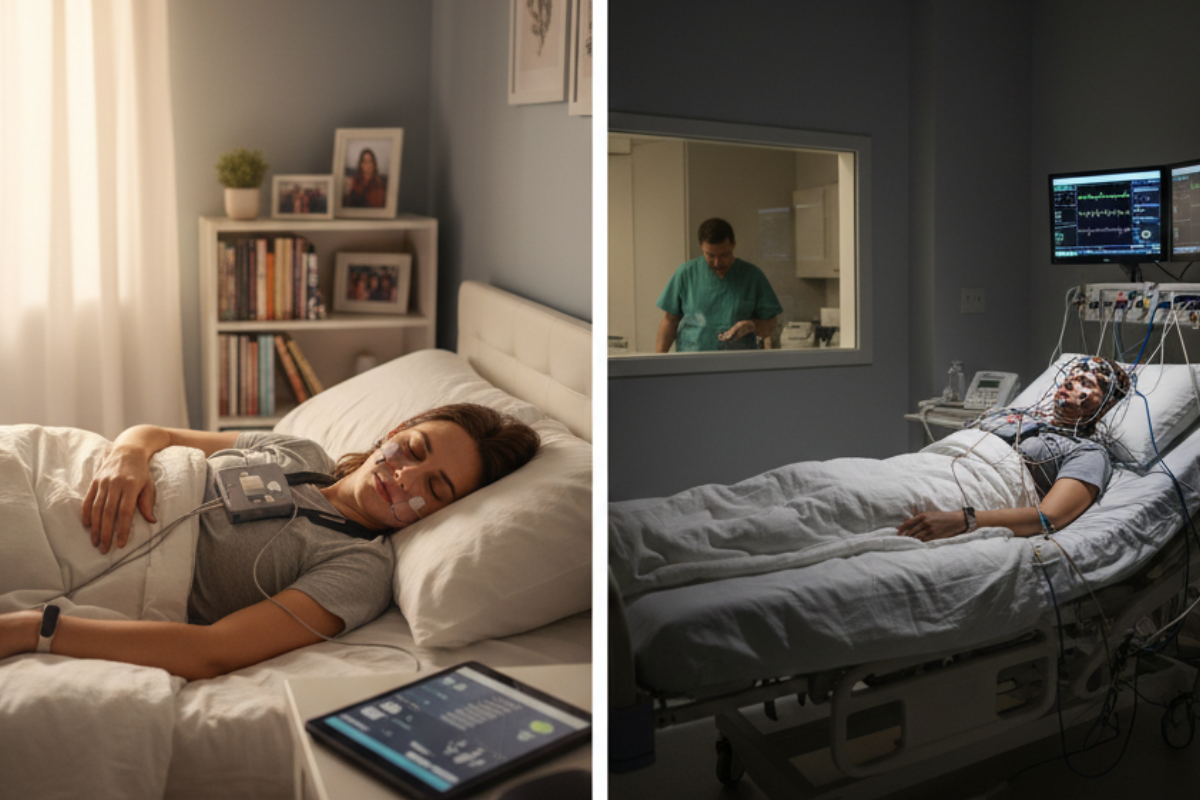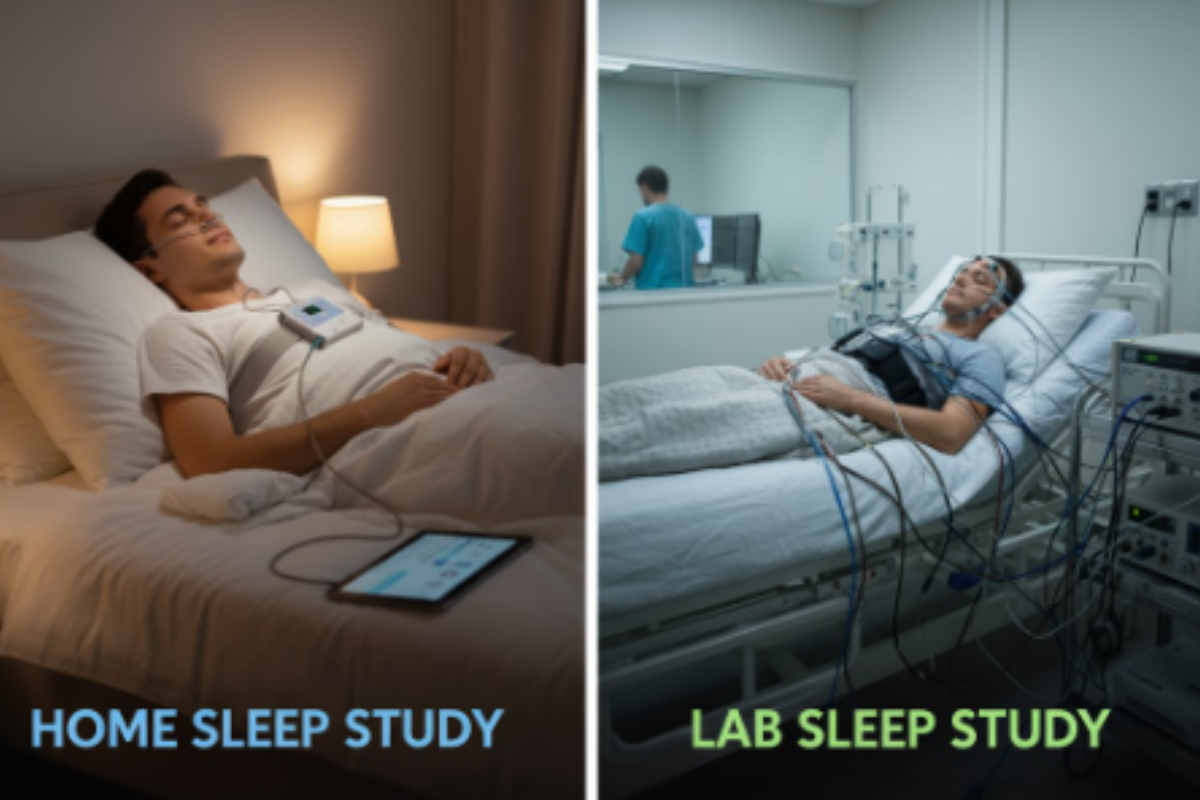When it comes to diagnosing sleep disorders, many people wonder whether a home sleep study or a lab sleep study is the right choice. Both approaches can help identify issues like sleep apnea, insomnia, and restless leg syndrome, but they differ in comfort, accuracy, and setup.
At JCS Lung & Sleep Centre, one of Delhi’s leading centers for sleep and lung health, we help patients choose the right test based on their symptoms, lifestyle, and medical needs.
In this guide, we’ll explore everything you need to know about Home Sleep Study vs. Lab Sleep Study, including how each test works, their advantages, limitations, and when you should choose one over the other.
Understanding Sleep Studies
Before comparing Home Sleep Study vs. Lab Sleep Study, it’s essential to understand what a sleep study actually is.
A sleep study (also called polysomnography) is a diagnostic test that monitors your breathing, brain activity, heart rate, and oxygen levels while you sleep. These factors help doctors detect sleep disorders such as:
Because sleep disorders can severely affect your energy, mood, and long-term health, identifying them early is crucial.
However, choosing between a home-based and a lab-based test can feel confusing — and that’s exactly what we’ll clarify next.
What Is a Home Sleep Study?
A home sleep study is a simplified version of the traditional sleep test that you can perform in the comfort of your home.
You’ll receive a compact, easy-to-use device from your doctor — typically consisting of sensors that monitor your airflow, oxygen levels, and breathing effort.
How It Works
- The sleep specialist explains how to use the device.
- You take it home and wear it overnight while sleeping in your usual environment.
- The device records your data, which is later analyzed by a sleep expert at JCS Lung & Sleep Centre.
This test is often recommended for people suspected of having moderate to severe obstructive sleep apnea.
Advantages of a Home Sleep Study
- Comfortable and convenient: You can sleep in your own bed.
- Affordable: It costs significantly less than a lab study.
- Quick results: Since the setup is simple, results are usually available faster.
- Accessible: Ideal for patients who find it hard to travel or stay overnight at a clinic.
Limitations
However, a home sleep study records fewer parameters compared to a lab test.
It may not detect other sleep disorders like narcolepsy or parasomnias. Moreover, if the sensors come loose during sleep, the data may be incomplete.
What Is a Lab Sleep Study?
A lab sleep study, also known as polysomnography, is performed overnight at a certified sleep lab such as JCS Lung & Sleep Centre in Delhi.
During the study, a trained sleep technician monitors you throughout the night while advanced equipment tracks multiple physiological parameters.
How It Works
- You arrive at the sleep lab in the evening.
- Sensors are gently attached to your scalp, face, chest, and legs.
- You sleep in a quiet, comfortable room while data is recorded continuously.
- A sleep expert analyzes the results to provide a comprehensive diagnosis.
Advantages of a Lab Sleep Study
- Detailed monitoring: It tracks brain waves, muscle activity, heart rate, and more.
- Accurate diagnosis: Ideal for complex sleep disorders.
- Professional supervision: Trained technicians ensure reliable results.
- Safe environment: Medical staff are available throughout the night.
Limitations
Despite its accuracy, a lab sleep study can be more expensive and slightly uncomfortable for patients who struggle to sleep in a clinical environment.

| Aspect | Home Sleep Study | Lab Sleep Study |
|---|---|---|
| Location | At home | Sleep lab |
| Comfort | High – familiar environment | Moderate – unfamiliar setting |
| Cost | More affordable | More expensive |
| Monitoring | Limited parameters | Comprehensive monitoring |
| Disorders Detected | Mainly sleep apnea | Wide range of sleep disorders |
| Supervision | None | Technician-monitored |
| Accuracy | Good for OSA | Excellent for all disorders |
As you can see, both methods have unique advantages. Therefore, the choice between Home Sleep Study vs. Lab Sleep Study largely depends on your symptoms and your doctor's recommendation.
When Should You Choose a Home Sleep Study?
You may be a good candidate for a home sleep study if:
- You have symptoms of obstructive sleep apnea (snoring, pauses in breathing, daytime sleepiness).
- You prefer sleeping in your own bed.
- You don’t have other major health issues that might affect sleep.
- You need a cost-effective option.
For instance, if you snore heavily but otherwise feel healthy, a home test may be sufficient.
When Should You Opt for a Lab Sleep Study?
A lab sleep study is better suited if:
- You experience complex or multiple sleep issues.
- Your previous home test was inconclusive.
- You have underlying health conditions like COPD or heart disease.
- You suspect disorders like narcolepsy or restless leg syndrome.
At JCS Lung & Sleep Centre, our sleep specialists often start with a home test and recommend a lab study only if necessary, ensuring that patients get accurate yet comfortable care.
Expert Insights from JCS Lung & Sleep Centre
At JCS Lung & Sleep Centre, we believe that quality sleep is the foundation of good health.
Our team, led by experienced sleep physicians, uses advanced diagnostic tools to evaluate each patient’s sleep health thoroughly.
We also provide personalized treatment plans that include:
- CPAP therapy for sleep apnea
- Lifestyle and behavioral counseling
- Follow-up monitoring to track progress
Moreover, because every patient’s sleep problem is unique, we take the time to explain test results and guide you toward the right treatment.
The Role of Technology in Modern Sleep Diagnosis
Technology has made sleep studies more accessible and accurate than ever.
Today’s home sleep devices can capture high-quality data, while lab studies use advanced sensors to detect subtle patterns in sleep architecture.
As a result, both types of tests can deliver reliable insights — as long as they’re interpreted by a qualified sleep specialist.
At JCS Lung & Sleep Centre, all tests are analyzed by expert pulmonologists and sleep doctors to ensure the highest level of precision.
How to Prepare for a Sleep Study
Whether you’re scheduled for a Home Sleep Study or a Lab Sleep Study, preparation can help improve accuracy.
Preparation Tips
- Avoid caffeine or alcohol on the day of the test.
- Wash your hair (no oils or sprays).
- Bring comfortable sleepwear.
- Follow your doctor’s medication instructions.
- Try to maintain your usual bedtime.
Additionally, if you feel anxious, speak to your sleep doctor beforehand — reassurance often makes the process smoother.
Making the Right Choice
Choosing between Home Sleep Study vs. Lab Sleep Study ultimately depends on your symptoms, convenience, and medical condition.
For simple cases like suspected sleep apnea, a home test can be sufficient. However, for complex or inconclusive cases, a lab test provides deeper insight.
Therefore, consulting a sleep specialist in Delhi at JCS Lung & Sleep Centre is the best way to make an informed decision.
Conclusion
Both Home Sleep Study and Lab Sleep Study play vital roles in diagnosing sleep disorders.
While home studies offer comfort and convenience, lab tests provide comprehensive data and expert supervision.
Ultimately, your sleep health deserves expert attention — and that’s exactly what you’ll receive at JCS Lung & Sleep Centre.
So, if you suspect a sleep disorder, don’t wait. Book your consultation today and discover how better sleep can transform your health.
FAQs- Home Sleep Study vs. Lab Sleep Study
A lab sleep study is more accurate because it monitors multiple parameters under supervision. However, a home test is highly effective for detecting sleep apnea.
It’s best to consult a sleep specialist before taking the test to ensure proper setup and interpretation.
Both types usually require one night of recording, though lab studies may start earlier for setup.
If your results are unclear, your doctor may recommend a lab sleep study for a more detailed evaluation.
Yes. Most patients find it comfortable since it’s performed in their own homes.

